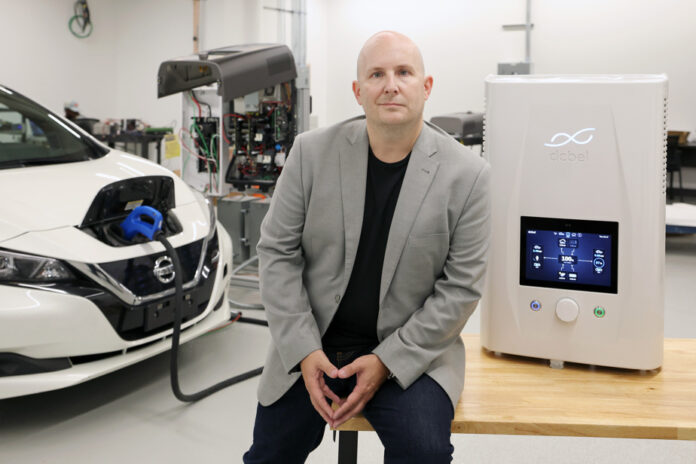A Montreal company is attracting more and more attention with its positioning in energy efficiency management.
dcbel raises $70 million in a financing round involving Quebec investors.
Dcbel has designed a residential two-way energy station to charge an electric car and then redirect the electricity from the vehicle’s battery to the house as needed or even sell the energy back to a utility company.
The dcbel station allows homeowners to use energy sources like solar panels, stationary batteries and electric cars.
The financing round was led by Idealist Capital, a Montreal-based investment firm focused on energy transition and clean technologies, which is providing approximately 50% of the total amount.
Investissement Québec and other investors are also participating in the financing round which, according to our information, values dcbel at more than 170 million Canadian dollars.
dcbel CEO and founder Marc-André Forget says the company is set to roll out the first-ever certified two-way residential electric car charger. The funding will be used to increase delivery capacity, he says, to accelerate the rollout of the product in “target territories,” starting with California, Texas and Florida, where energy prices are high. .
France, England and Canada will follow. “Our energy is relatively cheap in Quebec,” says Marc-André Forget. “You don’t necessarily have a problem with repeated blackouts like in California or Texas, where energy prices are ridiculous,” he says.
“In Quebec, we are lucky, we pay between 9 and 10 cents/kWh and there is no dynamic pricing. It’s all you can eat. It’s the Chinese electricity buffet and what’s more, we’re 100% renewable and 99% carbon-free. It’s extraordinary,” adds the electrical engineer by training.
“In California, however, during off-peak hours—so excluding dinner—citizens pay 16 cents/kWh. But between 5 p.m. and 8 p.m., the rate goes up to 61 cents/kWh. It is six times more than here. »
Unlike in Quebec, the 48-year-old entrepreneur points out that the energy market is not a state monopoly in Texas, for example.
There, you can subscribe to an energy provider like you do to an internet provider, he says. “Rates are variable depending on the time and sometimes the temperature. This is where our residential energy station makes the difference. »
He explains that the dcbel station is smart and learns to recognize when its owner uses energy, when his car comes home and how the vehicle is used in order to find a way to power the house and s to ensure that the car will always have the right amount of energy, at the lowest possible price and in the most carbon-free way possible.
Marc-André Forget adds that the product even tells its user what performance he would get if he installed solar panels and a residential battery.
“If you live in a place where the cost of energy at dinner is very expensive while you accumulate surplus solar energy at noon, it becomes interesting to store the energy and use it at dinner instead to buy it from the power grid. »
While a dcbel unit sells for around US$5,000, Marc-Andre Forget says the competition is more expensive, less powerful, and doesn’t offer a “smart” product, and that dcbel is set to launch a more affordable product in a few month.
The system becomes particularly interesting at a time when power outages are likely to increase due to extreme events caused by climate change, underlines Pierre Larochelle, co-partner and director of Idéaliste Capital.
“Dcbel has signed agreements with Volvo and Nissan in particular, and could become a world leader, considering the advance and the unique solution (hardware / software) developed”, adds the one who is also chairman of the board of Lion Electric.
“There will eventually be hundreds of millions of vehicles on the road with batteries of quite significant energy capacity. The key will be to find a way to use it to help manage peak hour energy demand,” says Pierre Larochelle.
The sale of energy by private companies and individuals to utility companies is expected to grow over the next few years, and the manufacturer of 100% electric buses and trucks Lion, of Saint-Jérôme, could benefit. For this, it is obviously necessary that the public service companies, like Hydro-Québec, show an interest in buying electricity from individuals, relates Pierre Larochelle, chairman of the board of directors of Lion. On the other hand, he gives the example of a fleet of about a hundred school buses parked for the summer months. “If you have 600 buses with a 300 kWh battery, that’s 30 MWh, which is quite significant. Having an agreement to resell electricity to a utility company at specific times can pay off,” he says. “It takes a regulatory framework, but California is moving fast,” he adds. The situation interests Lion because it can become an attractive source of income for the owner of a bus fleet, which could indirectly stimulate more interest in buying electric buses by realizing that it could generate new sources of income. with purchased electric buses.















